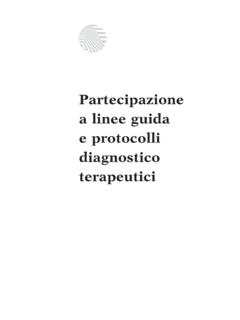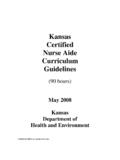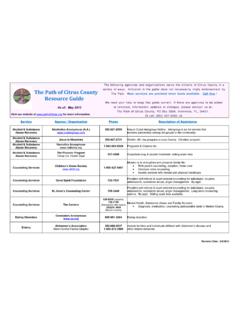Transcription of Certificate in Dementia Care Level 3 Continuous ...
1 South of Tyne & Wear Workforce Collaborative & Tyne & Wear Care Alliance Certificate in Dementia Care Level 3 Continuous Professional Development Portfolio Incorporating Written Questions Projects Reflective Diaries Name Establishment Date of Training 1 Contents Page Acknowledgements 2 Foreword 3 Overview of Training Programme for Dementia Liaison and Co-ordination Champions 4 Session aims and outcomes for 2-Day Dementia Programme 5 Projects 7 Questions DEM 301 Understand the neurology of Dementia 11 Dem 304 Enable rights and choices of individuals with Dementia whilst minimising risks. 13 DEM 312 Understand and enable interaction and communication with individuals who have Dementia . Level 3, credits 4 14 DEM 313 Equality, diversity and inclusion in Dementia care practice.
2 15 Dem 302 Understand and meet the nutritional requirement of individuals with Dementia . 16 DEM 305 Understand the administration of medication to individuals with Dementia using a person centred approach Level 3, credits 2 17 Using a Model of Reflection 18 Johns Model of Reflection Using the Post Training Impact Measurement Tool 19 Appendix 1 - Post Training Impact Measurement Tool 24 Appendix 2 - Certificates 2 Acknowledgements Moira Pinkney Manager Tyne and Wear Care Alliance On behalf of the Tyne and Wear Care Alliance and its members I d like to thank all those whose contribution made this training package possible. By working in partnership, training has been developed and piloted with the aim of ensuring that frontline Health and Social Care staff have the necessary knowledge, skills and attitudes relating to working with people who have Dementia to promote quality care and support.
3 This training package has been developed with the help and encouragement of a number of partners and individuals. Thank you to: North East Regional Development of Skills Group Richard Scott: Senior Business and Contracts Manager Business Delivery Team Dr Wendy Kaiser: Strategic lead - Mental Health Model of Care, NHS South of Tyne & Wear. Sharon Champion: Clinical Lead Community Challenging Behaviour Function Older Persons CMHT South of Tyne and her team. Daniel Collerton: Consultant Clinical Psychologist, University of Newcastle upon Tyne Aspects of the training on working with behaviours which challenge are based upon Challenging Behaviour and Dementia in Gateshead a guide to understanding, coping and responding, developed collaboratively by Gateshead Health NHS Foundation Trust; Northumberland, Tyne and Wear NHS Foundation Trust; Gateshead Council; Mental Health Concern; and the Gateshead branch of the Alzheimer's Society, amongst others Finally to the team at the Alliance, who continue to strive to support the independent care sector to develop their staff.
4 3 Foreword Dr Wendy Kaiser Strategic lead Mental Health Model of Care South of Tyne NHS The National Dementia Strategy was launched in 2009 by the Department of Health in England. The strategy was based on extensive consultation with service users and carers about what was important to them when they were living with Dementia . The strategy therefore sets out what we need to do to support people with Dementia to live well throughout their journey. Many people living in residential and nursing care have some form of mental health need, such as Dementia or depression, which affects their quality of life and their general health and wellbeing. The care provided by the staff working in care settings is key to living well with Dementia . Staff are also very well placed to provide information and support to families of people living with Dementia in care.
5 By undertaking the Certificate in Dementia care, each Dementia Champion will be able to improve the quality of life of the people they are caring for, and their families. They will also be able to lead and support their colleagues in further improving the quality of care in their care setting. We hope you enjoy this programme and that it enhances your confidence when delivering Dementia care. Your participation and feedback is essential. If you have any difficulties, compliments or comments please contact your Network Development Officer. Copies of Living well with Dementia : A National Dementia Strategy can be downloaded from 4 Overview of Training Programme for Dementia Liaison and Co-ordination Champions The learning programme will ensure that the 6 Specific Behaviours required to support the delivery of the National Dementia Strategy are covered :- These behaviours are; 1.
6 Communication 2. Early Diagnosis, Assessment and Care Planning 3. Maintaining Quality of Life through Co-ordination 4. Advanced Care Planning 5. Meeting Carers needs 6. Overarching values and knowledge The programme incorporates the following elements 1. What is Dementia ? 2. Common types of Dementia . 3. Signs and symptoms of Dementia . 4. How Dementia is diagnosed 5. What are the legal frameworks which apply to people with Dementia particularly around capacity and consent? 6. What is challenging behaviour? 7. What is a person centred approach to caring for someone with Dementia ? 8. How Life History work can impact upon person centred care. 9. Medicines and challenging behaviour. 10. Nutritional need of a person with Dementia . 11. The needs of the carers and families of the person with Dementia 5 Session aims and outcomes for 2 Day Training Programme for Dementia Champions.
7 Day 1 Session aims; To provide the learner with an understanding of Dementia , which enables them to empathise with the person and their family that they are caring for. To be aware of the legal frameworks which apply to people with Dementia . To increase knowledge/understanding of challenging behaviour and the impacts of physical/mental and neurological conditions. To define Dementia and to increase awareness of signs/symptoms To be aware that other factors maybe cause Dementia -like symptoms, such as infections, medicines or pain. To promote person centred care, psycho-social and non-pharmacological interventions. To understand the importance of good nutrition for people with Dementia care. To understand the effect of pain upon behaviour for people with Dementia . Session outcomes - at the end of the session participants will be able To explain the impact of key legislation that relates to fulfilment of rights and choices and the minimising of harm for an individual with Dementia .
8 To identify behaviours which challenge us Understand the factors that can affect interactions and communication of individuals with Dementia To understand the difference between delirium and Dementia To appreciate that not all Dementia -like behaviour is caused by Dementia . To investigate reversible factors first. To understand person centred approaches to care To understand the importance of Life History work To discuss dignified care and the impact of the care environment on behaviour To describe a good diet To understand the consequences of malnutrition To know how to assess for malnutrition (using MUST) To gain insight into the effects of pain on a person with Dementia 6 Day 2 Session aims To develop an understanding of medicines and challenging behaviour To develop knowledge around antipsychotic medicines To understand the term Dementia To be aware of common types of Dementia To be able to describe a range of causes of Dementia To gain an awareness of the key functions of different areas of the brain To develop skilful communication techniques for communicating with the person with Dementia , their family and informal carers To develop an understanding of effective person centred care ( Newcastle model)
9 Session outcomes - at the end of the session participants will be able To identify anti-psychotic medications To describe side effects to these medicines To identify and discuss own limitations regarding the prescription and use of these therapies To define and describe Dementia To identify some common types of Dementia To explore own responsibilities in behaviour/symptom assessment To identify and discuss challenging behaviours/symptoms To describe the components of person centred care To identify symptom management strategies within person centred care 7 Introduction Project 1: I am Life History work Gain consent to work with 2 people, who have Dementia . Engage with them, at a pace that is comfortable to them over a 6 week period, gathering information and compiling a life history. Explain to these people and their families that you are taking a sincere interest in them and valuing their experiences to help enhance the care provided and to gain insight into how best to support them.
10 Start your work with the sentence I am (insert the person s name) Guidance notes Each person s experience of Dementia is unique, depending on a number of variable factors, which impact on how they cope with their condition. These factors include their Life History or Biography, Health, Personality, Neurological Impairment and Social Psychology. Start a Case study on 2 different people with Dementia , begin by looking at the above points and thinking about how these impact on the person s experience of Dementia . Using the Newcastle model begin to document in-depth life histories for these people, talk to them and their families. Start to think about their family life, education and work experiences, achievements, disappointments, significant events, likes, dislikes, interests, hobbies, values and beliefs. Gather photos, meaningful items and use these to create a tool to tell the person s life story (talk to them about how they can access this, some establishments have created wall displays, scrap book or memory boxes) Observe the emotions and memories evoked Week 6 Complete a reflective report on this project, compare and contrast (what is similar, what is different) the way the 2 people are affected by their conditions.






